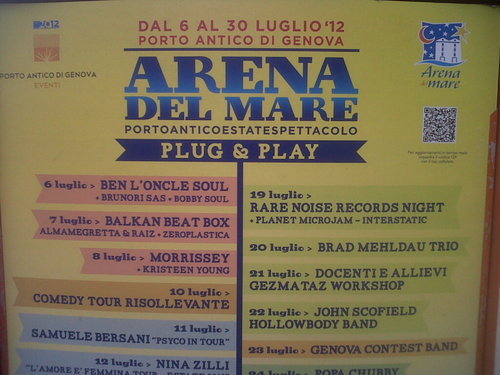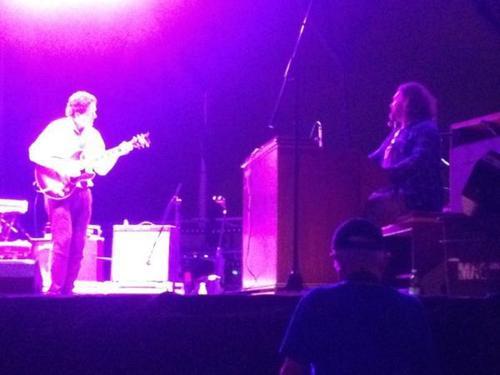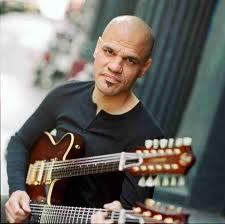
Flying into Genoa airport on a humid July day the first thing that hit home is how close the tarmac of the runway is to the lapping waves of the sea. The modest heat of an overcast morning was nonetheless a welcome blast of goodness after the dreary English summer so far and matched the warmth of the prevailing reddish hue of many buildings along the way as the speedy cab driver drove like a bat out of hell from the airport to the hotel ahead of the gig in the evening.
Genoa has Italy’s largest port and there on the horizon as we sped along it was a cinch to spot slumbering tankers and ferry boats alike, just little dots in the distance. I was over in the Ligurian city to review a double bill of two bands, Planet Microjam from the United States and Interstatic from Norway who were to appear at the city’s Gezmataz Jazz Festival in the evening mounted by their London-based label RareNoise records on an open air stage at Porto Antico, the ancient port, now pedestrianised and revamped following a major overhaul in the 1990s. Trendy restaurants, little boutiques and tempting cafes were all scattered about the streets close to the venue, with old cotton warehouses, like old warehouses everywhere these days, used for everything except their original purpose. The seemingly ubiquitous architect Renzo Piano – he of the Shard and the ongoing reconstruction of Valletta’s historic city gate – has also been busy at work in Genoa creating the Bigo, a big quasi sculptural statement in the harbour resembling out size cranes or monstrous daddy long legs as part of a big development.
Before the gig at the Arena del Mare I joined members of Planet Microjam and Interstatic and personnel from RareNoise for dinner at a long table set out in front of the Rossopomodoro ‘Red Tomato’ restaurant (house speciality: Neapolitan pizza), and the pizza seemed to go down a treat washed down with a little vino. RareNoise is a London-based label, less than four years old run by the winningly enthusiastic Giacomo Bruzzo, who just recently brought the great Bob Belden to London for some rare dates. The label prides itself on promoting experimental non categorisable artists of note and both the bands to play later in the evening fit this aspiration completely. Giacomo introduced the musicians to the small but appreciate audience with first up a rare sighting of expat English organist Roy Powell, now living in Norway, whose band Interstatic chimes completely with the current wave of young prog jazz bands like Troyka and WorldService Project making an impact on the scene back in England.

Opening proceedings Powell on Hammond organ was joined by Tord Gustavsen Trio drummer Jarle Vespestad in unlikely jazz-rock mode along with tasteful guitarist Jacob Young playing in a bluesier style than you’d expect from his work for ECM. Powell channelled Keith Emerson and even the late Jon Lord into his lively style but explained to the audience that Interstatic play like Tony Williams’ Lifetime, most evident on their tune ‘The Elverum Incident’, but with a few modern twists. Yet the band took leave of this inspiration many times during a set only slightly hampered by a pedal of Young’s guitar needing to be replaced. Playing material mainly from the eponymous Interstatic release Powell got well and truly stuck in like some sort of hippy organ guru griot specially attuned to the sultry Genoese night.

Microjam were something else entirely, an experimental microtonal band led by David “Fuze” Fiuczynski who with his trademark double necked guitar specially tuned to allow for the band’s distinctive quarter tones, rocked up with the microtonal keyboards of young Turk Utar Artun to his side, although the main direction came through his duetting with English violinist Helen Sherrah-Davies. Kansas City drummer Alex Bailey, and the colourfully dressed Memphis bass guitarist Dywane ‘MonoNeon’ Thomas, who plays his bass guitar right handed but upside down, cooked up a mysterious heat around ‘Micro Emperor’, a fragment of Beethoven’s 5th Piano Concerto.
Now heading up the Microjam Institute at Berklee in Boston Fiuczynski’s set based on music from the Planet Microjam record was a compelling snatch of a style of music you rarely get to hear, certainly not in a jazz setting. Sun Ra’s ‘Sun Song’ originally on the 1957 album Jazz By Sun Ra was for me the outstanding performance of the night, and let’s hope we hear more on this side of the Atlantic again from Helen Sherrah-Davies who like Fuze also teaches at Berklee.
Fuze is back with a great new concept to run with. It’s up to the rest of the jazz planet to catch up with this particular rare noise.
Flying out of Genoa the next day there was a chance to reflect on how all this new music will sit with listeners coming to it for the first time. The music is clearly out there but has a distinctive enough character to make it stand out from all the rehashes and reimaginings circling around the European festival scene this summer.
Fuze faces the future head on with Microjam. and Interstatic somehow have managed to breathe new life into the tired organ trio formula, no small feat for sure.
– Stephen Graham
Read my review of the double bill in the September issue of Jazzwise. Gezmataz poster (pictured, top), Interstatic, and David Fiuczynski